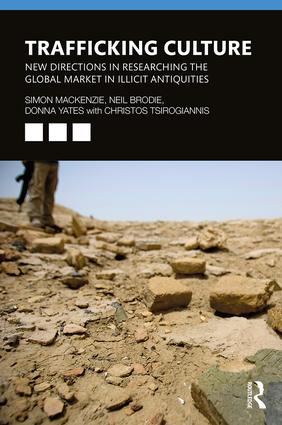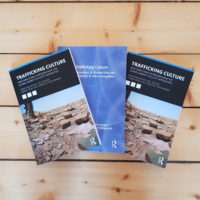New book By Simon Mackenzie, Neil Brodie, and Donna Yates, with Christos Tsirogiannis

I’m are pleased to announce the publication of our book, Trafficking Culture, with Routledge. This monograph presents the core results of the Trafficking Culture Project, outlining the structure and functioning of this illicit trade and providing clear pathways for understanding the global trafficking of antiquities.
The book is available on the Routledge website at: https://www.routledge.com/Trafficking-Culture-New-Directions-in-Researching-the-Global-Market-in/Mackenzie-Brodie-Yates-Tsirogiannis/p/book/9781138692497
For a limited time, a 20% discount on the book is available when you use code FLR40 at checkout
Description
Trafficking Culture outlines current research and thinking on the illicit market in antiquities. It moves along the global trafficking chain from ‘source’ to ‘market’, identifying the main roles and routines involved. Using original research, the authors explore the dynamics of this ‘grey’ market, where legal and illegal goods are mixed and conflated. It compares and contrasts this illicit trade with other ‘transnational criminal markets’, such as the illegal trades in wildlife and diamonds.
The analytical frames of organized crime and white-collar crime, drawn from criminology, provide a fresh perspective on a problem that has tended to be seen as archaeological, rather than criminological. Bringing insights from both disciplines together, this book represents a productive discourse between experts in these two fields, working together for several years to produce the evidence base that is reported here.
Innovative forms of regulation are the most productive way to explore crime control in this field, and this book provides a series of propositions about practical crime reduction measures for the future. It will be invaluable to academics working in the fields of archaeology, criminology, art history, museum studies, and heritage. The book will also be a vital resource for professionals in the field of cultural property protection and preservation.
Contents
Chapter 1: The Structure of the Global Market in Illicit Antiquities: Actors, Drivers, Mechanisms
Chapter 2: Interfaces and antiquities smuggling chains: blurring on the margins of “Source”, “Transit”, “Destination Market”
Chapter 3: The trade in illicit antiquities as a transnational criminal market
Chapter 4: The destination market
Chapter 5: White collar crime and facilitation of the criminal market by ‘legitimate’ actors
Chapter 6: Autoregulation of the destination market?
Chapter 7: Regulation, Self-Regulation and Ethical Consumption Markets
Chapter 8: Policy failure, policy future
Appendix: Case Studies
Reviews
“The writers have produced an outstanding overview of the flow of antiquities, moving from the source of the looting or excavation, through transit states, and culminating in museums, showrooms, and private collections. This book stands as an excellent summary of the work being done on this illicit trade, and will be an invaluable resource for those familiar with the subject, and for those new to it.” – Prof. Derek Fincham, South Texas College of Law Houston, USA
“This fascinating book will become the go-to resource on the global market in illicit antiquities. The authors’ in-depth investigations into this devastating global crime problem highlight the importance of collecting and analysing evidence to counter the justifications that can exist in the often grey worlds that thrive around illicit antiquities. Highly accessible, the book engages with theory, research methods and international policy in a manner that provides a valuable counterpoint to much work on the area that is based on conjecture. In presenting their hugely significant Trafficking Culture research, the authors also promote an important future policy approach. The book will inspire future research into the global market in illicit antiquities and serve as an example of how it should be undertaken.” – John Kerr, University of Roehampton, UK
